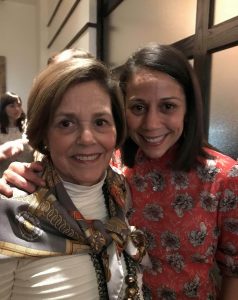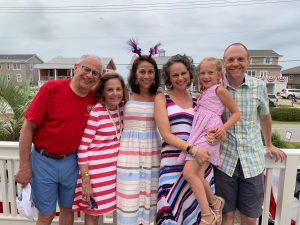Beth Silverstein is celebrating five years since she took charge of her destiny.

After consulting with an interdisciplinary team of “angel doctors” from the University of North Carolina Lineberger Comprehensive Cancer Center, the Charlotte resident made a series of health decisions that changed her life.
She decided to have a bilateral mastectomy on Feb. 3, 2015, and a Salpingo-oophorectomy to remove her ovaries and fallopian tubes the following year.
Utilizing cancer genetic testing
Silverstein, 42, took those steps after learning she was at high risk for breast and ovarian cancer. She is of Ashkenazi Jewish descent, an ethnicity that has a higher risk of genetic mutations linked to breast and ovarian cancer. While she had a family history of breast cancer, it was an inconclusive mammogram that led her to get genetic testing at the UNC Cancer Genetics Clinic.
The genetic testing revealed she was positive for a BRCA1 mutation. Based on those results, and her family history, experts at the clinic informed her she had high lifetime cancer risks – up to 80 percent for breast cancer, and up to 50 percent for ovarian cancer.
“I thought it would put this huge cloud over my head, and it would stress me out to no end,” Silverstein said of testing. “But what I didn’t know, and what I found out after I got tested, was the amount of clarity and control it gave me. It put me in the driver’s seat of my destiny.”
Thankful for access and knowledge
Silverstein’s team of physicians helped her understand her test results and her options, including increased screening and preventive treatment measures.
By identifying cancer patterns in a family and the use of genetic testing, genetic counselors at the UNC Cancer Genetics Clinic can help empower patients and their families to make decisions that best fit their lifestyle and goals – whether that means pursuing preventive treatment, additional screening or finding increased support.
“For families with hereditary cancer predisposition, identifying the genetic cause of the cancer can help guide the care of newly diagnosed patients, identify others who may be at risk so that they can take advantage of preventive measures and reassure those who do not carry the familial risk factor,” said UNC Lineberger’s Jonathan Berg, MD, PhD, a professor in the UNC School of Medicine Department of Genetics.
Across the next several years, Silverstein embarked on a journey that included fertility preservation in addition to her surgeries.
Silverstein said her decision to undergo preventive surgery was not made lightly, and it was a choice she made after speaking with her medical team.
She wanted to stay ahead of her cancer risks. Her mother was diagnosed with breast cancer at age 39, and her grandmother passed away from the disease at a young age.
“People have said ‘you’re so brave, and you’re so strong,’ ” she said. “I’m not; I just made the decision of what’s right for me … I have to continue to figure out how I can make a difference with my experience for others.”
Celebrating five years
Now she’s marking five years since her decision to move forward with preventive surgery. She has physical reminders of her choices, but doesn’t really think about it anymore – which she said is freeing.

“The whole first year I felt so lucky; it all went back to the access I had,” Silverstein said. “I kept thinking how thankful I was that I had the resources, I had the knowledge, and there was a little bit of me that had the desire to do something with the information I had … it’s crazy because I’ve gotten to this point where I don’t even think about it.”
In the time since her surgery, Silverstein, an alumna of UNC-Chapel Hill and of the UNC Kenan-Flagler Business School, has been able to focus on her career.
She bought her first house, and has served as board chair of a local nonprofit.
She loves to travel and do yoga, to exercise, and spend time with friends and family – especially her niece.
For her 40th birthday, she traveled with her sister, her cousin and her friends to the Caribbean. The following year, she joined her sister, brother-in-law and niece for a trip to Sweden. Her mom, who also had breast cancer, just celebrated 31 years cancer-free. They celebrated their 50th wedding anniversary at the end of January – a huge milestone for many reasons.
Silverstein returns to the North Carolina Cancer Hospital annually to see her gynecologic oncologist and every three years for scans to ensure she’s cancer-free.
“I have so much trust in the cancer center,” she said. “I feel like the relationships I built are still there, even though they’re not front and center in my everyday life. I know my safety net is always there”
Empowering others with knowledge, access
Silverstein now calls herself a “previvor” – someone who beat cancer before it started.
She wants to empower others to get the information they need to make choices that are right for them.
Silverstein is now working to raise $50,000 for UNC Lineberger to support both new research into clinical cancer genetics and to help others get access to the clinic.
To learn more about Beth Silverstein’s story, read about the start of her cancer prevention journey, and read her personal blog.
